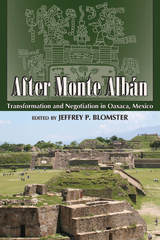
Contributors synthesize these regional transformations and continuities in the lower Rio Verde Valley, the Valley of Oaxaca, and the Mixteca Alta. They provide data from material culture, architecture, codices, ethnohistoric documents, and ceramics, including a revised ceramic chronology from the Late Classic to the end of the Postclassic that will be crucial to future investigations. After Monte Albán establishes Postclassic Oaxaca's central place in the study of Mesoamerican antiquity.
Contributors include Jeffrey P. Blomster, Bruce E. Byland, Gerardo Gutierrez, Byron Ellsworth Hamann, Arthur A. Joyce, Stacie M. King, Michael D. Lind, Robert Markens, Cira Martínez López, Michel R. Oudijk, and Marcus Winter.
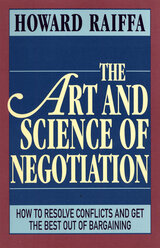
Whether you are selling a house, closing a business deal, settling a divorce, arbitrating a labor dispute, or trying to hammer out an international treaty, Howard Raiffa’s new book will measurably improve your negotiating skills.
Although it is a sophisticated self-help book—directed to the lawyer, labor arbitrator, business executive, college dean, diplomat—it is not cynical or Machiavellian: Raiffa emphasizes problems and situations where, with the kinds of skills he aims to develop, disputants can achieve results that are beneficial to all parties concerned. Indeed, he argues that the popular “zero-sum” way of thinking, according to which one side must lose if the other wins, often makes both sides worse off than they would be when bargaining for joint mutual gains.
Using a vast array of specific cases and clear, helpful diagrams, Raiffa not only elucidates the step-by-step processes of negotiation but also translates this deeper understanding into practical guidelines for negotiators and “intervenors.” He examines the mechanics of negotiation in imaginative fashion, drawing on his extensive background in game theory and decision analysis, on his quarter-century of teaching nonspecialists in schools of business and public policy, on his personal experiences as director of an international institute dealing with East/West problems, and on the results of simulated negotiation exercises with hundreds of participants.
There are popular books on the art of winning and scholarly books on the science of negotiation, but this is the first book to bridge the two currents. Shrewd, accessible, and engagingly written, it shows how a little analysis sprinkled with a touch of art can work to the advantage of any negotiator.
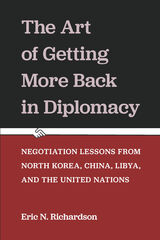
In the field of negotiation theory, the Harvard Project’s Getting to Yes and Donald Trump’s The Art of the Deal occupy polar opposition locations on a spectrum considering distributive and integrative negotiation theories. The Art of Getting More Back in Diplomacy offers case studies from international negotiations in which the author participated that can help illustrate the tactics and theories of each type of negotiation and to make students in law, business, and other fields into better negotiators. Among the case studies are lessons drawn from negotiating denuclearization with North Korea, political reconciliation in Libya, human rights improvements in China, Israel-Palestinian peace processes, and UN negotiations over surveillance, privacy, atrocities prevention, LGBT rights, and other fundamental freedoms. By illustrating these lessons, The Art of Getting More Back in Diplomacy strengthens the tools that students and teachers of negotiations should have in their negotiating toolbox. Perhaps most importantly, Richardson provides concrete examples of how a negotiator is likely to Get More Back for their clients if they deploy these tactics, rather than having them used against the negotiator.
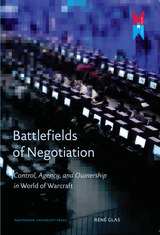

In Between the Sword and the Wall: The Santos Peace Negotiations with the Revolutionary Armed Forces of Colombia, Harvey Kline, a noted expert on contemporary Colombian politics, brings to a close his multivolume chronicle of the incessant violence that has devastated Colombia’s population, politics, and military for decades. This, his newest work on the subject, recounts and analyzes the negotiations between Colombian president Juan Manuel Santos and the Marxist Revolutionary Armed Forces of Colombia (FARC), which ended with a peace agreement in 2016.
The FARC insurgency began in 1964, and every Colombian president after 1980 unsuccessfully tried to negotiate a peace agreement with the group. Kline analyzes how the Santos administration was ultimately able to negotiate peace with the FARC. The agreement failed to receive the approval of the Colombian people in an October 2016 plebiscite, but a renegotiated version was later approved by the congress in the same year. Afterward, more than 7,000 rebels turned over their weapons to the UN mission in Colombia. The former combatants were then to be judged by a special court empowered to punish but not imprison those who had violated human rights. Throughout the book, Kline emphasizes the dual nature of the Santos negotiations, first with the FARC and second with the democratic opposition to the agreement led by former president Álvaro Uribe Vélez.
Kline provides readers with a well-researched analysis based on a variety of resources, including media articles and primary documents from the government, international organizations, and the FARC. He also conducted extensive interviews with twenty-eight government officials and Colombian experts from all ideological persuasions.

Conflict is inevitable, in both deals and disputes. Yet when clients call in the lawyers to haggle over who gets how much of the pie, traditional hard-bargaining tactics can lead to ruin. Too often, deals blow up, cases don’t settle, relationships fall apart, justice is delayed. Beyond Winning charts a way out of our current crisis of confidence in the legal system. It offers a fresh look at negotiation, aimed at helping lawyers turn disputes into deals, and deals into better deals, through practical, tough-minded problem-solving techniques.
In this step-by-step guide to conflict resolution, the authors describe the many obstacles that can derail a legal negotiation, both behind the bargaining table with one’s own client and across the table with the other side. They offer clear, candid advice about ways lawyers can search for beneficial trades, enlarge the scope of interests, improve communication, minimize transaction costs, and leave both sides better off than before. But lawyers cannot do the job alone. People who hire lawyers must help change the game from conflict to collaboration. The entrepreneur structuring a joint venture, the plaintiff embroiled in a civil suit, the CEO negotiating an employment contract, the real estate developer concerned with environmental hazards, the parent considering a custody battle—clients who understand the pressures and incentives a lawyer faces can work more effectively within the legal system to promote their own best interests. Attorneys exhausted by the trench warfare of cases that drag on for years will find here a positive, proven approach to revitalizing their profession.
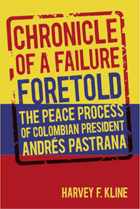
Charts the progress and failure of Colombian President Andrés Pastrana’s efforts to bring an end to sixty years of civil war.
The civil war in Colombia has waxed and waned for almost sixty years with shifting goals, programs, and tactics among the contending parties and with bursts of appalling violence punctuated by uneasy truces, cease-fires, and attempts at reconciliation. Varieties of Marxism, the economics of narco-trafficking, peasant land hunger, poverty, and oppression mix together in a toxic stew that has claimed uncounted lives of (most often) peasants, conscript soldiers, and people who just got in the way.
Hope for resolution of this conflict is usually confined to dreamers and millenialists of various persuasions, but occasionally an attempt is made at a breakthrough in the military stalemate between the government and the Marxist groups. One of the most promising such attempts was made by new Colombian President Andrés Pastrana at a time when the main rebel groups seemed receptive to serious dialogue. This book is an account of that effort at peace, accompanied at the outset by domestic and international support and hope, and yet doomed like so many others to eventual failure.
Through interviews with many of the actors in this drama, as well as an understanding of the various interest groups and economic forces at work in Colombia, Dr. Kline charts the progress and ultimate failure of this effort, and thereby hopes to increase understanding of the causes of its lack of success. The importance of the resolution of the conflict to the region and to ordinary citizens of this troubled land cannot be
overstated.
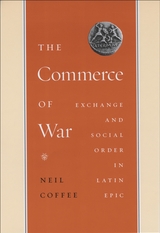
Latin epics such as Virgil’s Aeneid, Lucan’s Civil War, and Statius’s Thebaid addressed Roman aristocrats whose dealings in gifts, favors, and payments defined their conceptions of social order. In The Commerce of War, Neil Coffee argues that these exchanges play a central yet overlooked role in epic depictions of Roman society.
Tracing the collapse of an aristocratic worldview across all three poems, Coffee highlights the distinction they draw between reciprocal gift giving among elites and the more problematic behaviors of buying and selling. In the Aeneid, customary gift and favor exchanges are undermined by characters who view human interaction as short-term and commodity-driven. The Civil War takes the next logical step, illuminating how Romans cope once commercial greed has supplanted traditional values. Concluding with the Thebaid, which focuses on the problems of excessive consumption rather than exchange, Coffee closes his powerful case that these poems constitute far-reaching critiques of Roman society during its transition from republic to empire.
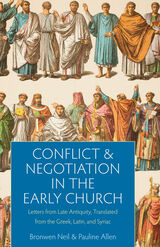
Conflict and Negotiation in the Early Church focuses on the period 500 to 700 CE, one of the least documented periods in the history of the church, but also one of the most formative, whose conflicts resonate still in contemporary Christian communities, especially in the Middle East.
To uncover the hidden history of this period and its theological controversies, Neil and Allen have tapped a little known written source, the letters that were exchanged by bishops, emperors and other civic leaders of the sixth and seventh centuries. This was an era of crisis for the Byzantine empire, at war first with Persia, and then with the Arab forces united under the new faith of Islam. Official letters were used by the churches of Rome and Constantinople to pursue and defend their claims to universal and local authority, a constant source of conflict. As well as the east-west struggle, Christological disagreements with the Syrian church demanded increasing attention from the episcopal and imperial rulers in Constantinople, even as Rome set itself adrift and looked to the West for new allies.
From this troubled period, 1500 letters survive in Greek, Latin, and Syriac. With translations of a number of these, many rendered into English for the first time, Conflict and Negotiation in the Early Church examines the ways in which diplomatic relations between churches were developed, and in some cases hindered or even permanently ruptured, through letter-exchange at the end of Late Antiquity.

South Korea is home to one of the most vibrant evangelical Protestant communities in the world. This book investigates the meanings of—and the reasons behind—an intriguing aspect of contemporary South Korean evangelicalism: the intense involvement of middle-class women. Drawing upon extensive ethnographic fieldwork in Seoul that explores the relevance of gender and women’s experiences to Korean evangelicalism, Kelly H. Chong not only helps provide a clearer picture of the evangelical movement’s success in South Korea, but interrogates the global question of contemporary women’s attraction to religious traditionalisms.
In highlighting the growing disjunction between the forces of social transformation that are rapidly liberalizing modern Korean society, and a social system that continues to uphold key patriarchal structures on both societal and familial levels, Chong relates women’s religious involvement to the contradictions of South Korea’s recent socio-cultural changes and complex engagement with modernity. By focusing on the ways in which women’s religious participation constitutes—both spiritually and institutionally—an important part of their effort to negotiate the problems and dilemmas of contemporary family and gender relations, this book explores the contradictory significance of evangelical beliefs and practices for women, which simultaneously opens up possibilities for gender negotiation/resistance, and for women’s redomestication.
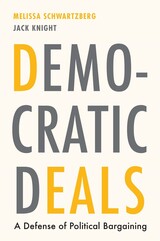
Two leading scholars of democracy make the case for political bargaining and define its proper limits.
Bargains—grand and prosaic—are a central fact of political life. The distribution of bargaining power affects the design of constitutions, the construction of party coalitions, legislative outcomes, judicial opinions, and much more. But can political bargaining be justified in theory? If it inevitably involves asymmetric power, is it anything more than the exercise of sublimated force, emerging from and reifying inequalities?
In Democratic Deals, Melissa Schwartzberg and Jack Knight defend bargaining against those who champion deliberation or compromise, showing that, under the right conditions and constraints, it can secure political equality and protect fundamental interests. The challenge, then, is to ensure that these conditions prevail. Drawing a sustained analogy to the private law of contracts—in particular, its concepts of duress and unconscionability—the authors articulate a set of procedural and substantive constraints on the bargaining process and analyze the circumstances under which unequal bargaining power might be justified in a democratic context. Institutions, Schwartzberg and Knight argue, can facilitate gains from exchange while placing meaningful limits on the exercise of unequal power.
Democratic Deals examines frameworks of just bargaining in a range of contexts—constitution-making and legislative politics, among judges and administrative agencies, across branches of government, and between the state and private actors in the course of plea deals. Bargaining is an ineradicable fact of political life. Schwartzberg and Knight show that it can also be essential for democracy.

Image by image and hashtag by hashtag, Instagram has redefined the ways we relate to food. Emily J. H. Contois and Zenia Kish edit contributions that explore the massively popular social media platform as a space for self-identification, influence, transformation, and resistance. Artists and journalists join a wide range of scholars to look at food’s connection to Instagram from vantage points as diverse as Hong Kong’s camera-centric foodie culture, the platform’s long history with feminist eateries, and the photography of Australia’s livestock producers. What emerges is a portrait of an arena where people do more than build identities and influence. Users negotiate cultural, social, and economic practices in a place that, for all its democratic potential, reinforces entrenched dynamics of power.
Interdisciplinary in approach and transnational in scope, Food Instagram offers general readers and experts alike new perspectives on an important social media space and its impact on a fundamental area of our lives.
Contributors: Laurence Allard, Joceline Andersen, Emily Buddle, Robin Caldwell, Emily J. H. Contois, Sarah E. Cramer, Gaby David, Deborah A. Harris, KC Hysmith, Alex Ketchum, Katherine Kirkwood, Zenia Kish, Stinne Gunder Strøm Krogager, Jonathan Leer, Yue-Chiu Bonni Leung, Yi-Chieh Jessica Lin, Michael Z. Newman, Tsugumi Okabe, Rachel Phillips, Sarah Garcia Santamaria, Tara J. Schuwerk, Sarah E. Tracy, Emily Truman, Dawn Woolley, and Zara Worth
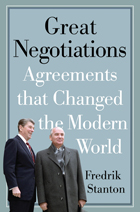
Lessons in Diplomacy from Colonial America to the Cold War
"In a time when negotiations, both great and small, continue to shape our world, this book provides an excellent opportunity to learn from the past and understand the present.”—Kofi Annan, Nobel Peace Prize Winner and former Secretary General of the United Nations
“A thought-provoking, informative book, highly recommended for all readers interested in international affairs.”—Library Journal
“For anyone with an interest in diplomacy and political history, Stanton's book is both entertaining and informative.” —Foreign Policy Watch
“Every professional concerned with dispute resolution and every student of negotiation has much to learn from Fredrik Stanton's lively stories of eight history-shaping negotiations.”—Robert H. Mnookin, Chair Program on Negotiation, Harvard Law School
“An excellent introduction into some of the great triumphs and failures of modern diplomacy.”—Seattle Post-Intelligencer
“An interesting, informative study well worth reading and pondering.” —American Diplomacy
“Stanton deftly illustrates that the power of haggling can easily rival that of any army or warhead.”—Roll Call
“Exhaustive research and careful thought have enabled Stanton to employ an extraordinary writing talent to produce a contribution to history and a source of enjoyable reading.”—New York Law Journal
“Stanton brings back to life both famous and some long forgotten personalities in the history of major American, European, and Asian negotiations. He persuasively makes his case for the importance of negotiators and negotiations both when wars can be kept from beginning and when wars end. He weaves in deft descriptions of the personal strengths and foibles of negotiators and homes in on the ability of the best to improvise when maneuvering on unfamiliar terrain.” —Ambassador Richard W. Murphy, Council on Foreign Relations
Words as much as weapons have shaped the course of history. Whether to avert, resolve, assist, or secure the outcome of a conflict, diplomacy in the modern age has had great triumphs and bitter failures, from the Cuban Missile Crisis in 1962, which narrowly spared humanity from a nuclear Armageddon, to the Treaty of Versailles after World War I, which created problems that still confront us today. Drawing on primary sources, transcripts, and interviews, Great Negotiations: Agreements that Changed the Modern World tells the stories of eight key episodes in modern diplomacy. From Benjamin Franklin securing crucial French support for the American revolution to Reagan and Gorbachev laying the groundwork to eliminate an entire class of nuclear weapons, Fredrik Stanton explains what each party brought to the negotiating table, the stakes, the obstacles to success, and how they were overcome.
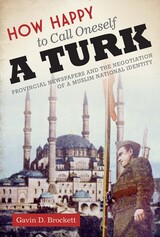
The modern nation-state of Turkey was established in 1923, but when and how did its citizens begin to identify themselves as Turks? Mustafa Kemal Atatürk, Turkey's founding president, is almost universally credited with creating a Turkish national identity through his revolutionary program to "secularize" the former heartland of the Ottoman Empire. Yet, despite Turkey's status as the lone secular state in the Muslim Middle East, religion remains a powerful force in Turkish society, and the country today is governed by a democratically elected political party with a distinctly religious (Islamist) orientation.
In this history, Gavin D. Brockett takes a fresh look at the formation of Turkish national identity, focusing on the relationship between Islam and nationalism and the process through which a "religious national identity" emerged. Challenging the orthodoxy that Atatürk and the political elite imposed a sense of national identity from the top down, Brockett examines the social and political debates in provincial newspapers from around the country. He shows that the unprecedented expansion of print media in Turkey between 1945 and 1954, which followed the end of strict, single-party authoritarian government, created a forum in which ordinary people could inject popular religious identities into the new Turkish nationalism. Brockett makes a convincing case that it was this fruitful negotiation between secular nationalism and Islam—rather than the imposition of secularism alone—that created the modern Turkish national identity.

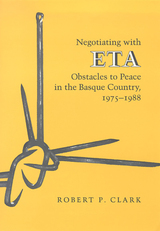
Since the late 1960s, the Basque insurgent organization ETA (Euzkadi ta Askatasuna, or Basque Homeland and Freedom) has been engaged in a violent struggle against the Spanish state in an effort to gain the independence of the Basque Country. ETA violence has led to the death of hundreds of people, making the organization the most violent insurgent group in Europe. Between 1975 and 1988, nearly thirty attempts to negotiate an end to violence, with a few limited exceptions, all ended in failure. This important book examines why the efforts to negotiate have failed and makes suggestions on how to improve the chances for successful discussion in the future. Although Clark does not disprove the conventional wisdom that negotiation with terrorists is a bad idea, he does begin from the opposing point of view that there may be some positive values to be realized from such negotiation.Negotiating with ETA describes the various factions that are interested in the outcome of such negotiations and the Spanish antiterrorist policy throughout the period under examination. The book also recounts the early attempts to negotiate, the first attempt at "social reintegration," various attempts by the Basque Government to get negotiations started, negotiation efforts under the Spanish socialist government of Felipe González, and the lengthy negotiations that took place in Algeria. A wide range of scholars and specialists will find this book valuable, including those interested in contemporary Spanish politics, ethnic nationalism, Basque affairs, the problem of terrorism, and conflict resolution.
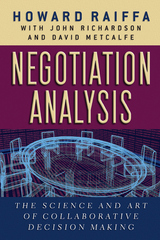
This masterly book substantially extends Howard Raiffa's earlier classic, The Art and Science of Negotiation. It does so by incorporating three additional supporting strands of inquiry: individual decision analysis, judgmental decision making, and game theory. Each strand is introduced and used in analyzing negotiations.
The book starts by considering how analytically minded parties can generate joint gains and distribute them equitably by negotiating with full, open, truthful exchanges. The book then examines models that disengage step by step from that ideal. It also shows how a neutral outsider (intervenor) can help all negotiators by providing joint, neutral analysis of their problem.
Although analytical in its approach--building from simple hypothetical examples--the book can be understood by those with only a high school background in mathematics. It therefore will have a broad relevance for both the theory and practice of negotiation analysis as it is applied to disputes that range from those between family members, business partners, and business competitors to those involving labor and management, environmentalists and developers, and nations.

The rise of the nurse practitioner as a new kind of health care professional has blurred the traditional distinction between physicians and nurses. Nurse practitioners argue that they combine both the traditionally male health care delivery of the M.D. and the traditionally female caring attention of the R.N. In her previous work Sue Fisher has analyzed the difficulties that women patients have in getting doctors to listen to their medical concerns. Now she asks whether women fare any better with nurse practitioners.
Nursing Wounds takes us into the examining rooms of nurse practitioners and doctors to listen to how health care professionals and women patients communicate. The nurse practitioners, unlike the doctors, go beyond the medical problem to ask about the social context of the patients' lives. In these exchanges the doctors insist on reinforcing both their professional status and dominant cultural assumptions about women. While the nurse practitioners sometimes do this, they also distance themselves from their professional identities, respond to their patients woman to woman, and undermine traditional understandings about gender arrangements.These differences have important consequences for the delivery of health care.
This compelling and complex analysis employs a range of theoretical perspectives–-from sociolinguistic to postmodern and materialist. Fisher concludes by urging a health care policy that capitalizes on the special strengths of nurse practitioners as providers of primary care who pay real attention to what their patients are saying and who support an alternative, even oppositional, understanding of women's lives.
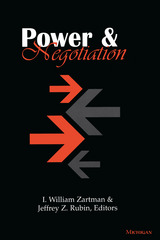
Power and Negotiation is a unique study that addresses the concept of power and produces new findings both about the concept itself and about its applications to negotiation. It rejects both the notion of power as a resource and power as an ability. Instead, the work defines power as an act that is designed to cause the other party to move in a desired direction, thus separating the concept both from its source and from its effects and leaving it open to much more detailed analysis. At the same time, it also examines perceived power on the basis of which symmetries and asymmetries in the relations between parties can be identified. It then looks at six cases of clear asymmetry, two cases of symmetry, and one mixed situation. The book ends with a careful examination of lessons for practice and lessons for theory.
The book will appeal to students of negotiation strategy and international relations.
I. William Zartman is Jacob Blaustein Professor of International Organization and Conflict Resolution, The Johns Hopkins University. The late Jeffrey Z. Rubin was Professor of Psychology at Tufts University.

Aaron T. Wolf has spent his career mediating such conflicts, both in the U.S. and around the world. He quickly learned that in negotiations, people are not automatons, programed to defend their positions, but are driven by a complicated set of dynamics—from how comfortable (or uncomfortable) the meeting room is to their deepest senses of self. What approach or system of understanding could possibly untangle all these complexities? Wolf’s answer may be surprising to Westerners who are accustomed to separating religion from science, rationality from spirituality.
Wolf draws lessons from a diversity of faith traditions to transform conflict. True listening, as practiced by Buddhist monks, as opposed to the “active listening” advocated by many mediators, can be the key to calming a colleague’s anger. Alignment with an energy beyond oneself, what Christians would call grace, can change self-righteousness into community concern. Shifting the discussion from one about interests to one about common values—both farmers and environmentalists share the value of love of place—can be the starting point for real dialogue.
As a scientist, Wolf engages religion not for the purpose of dogma but for the practical process of transformation. Whether atheist or fundamentalist, Muslim or Jewish, Quaker or Hindu, any reader involved in difficult dialogue will find concrete steps towards a meeting of souls.
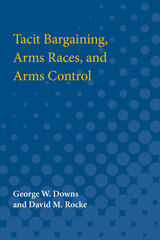
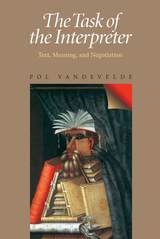
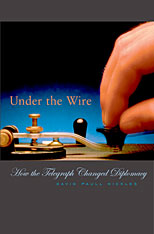
How did the telegraph, a new and revolutionary form of communication, affect diplomats, who tended to resist change? In a study based on impressive multinational research, David Paull Nickles examines the critical impact of the telegraph on the diplomacy of the nineteenth and early twentieth centuries.
Case studies in crisis diplomacy--the War of 1812, the Trent affair during the U.S. Civil War, and the famous 1917 Zimmermann telegram--introduce wide-ranging thematic discussions on the autonomy of diplomats; the effects of increased speed on decision making and public opinion; the neglected role of clerks in diplomacy; and the issues of expense, garbled text, espionage, and technophobia that initially made foreign ministries wary of telegraphy. Ultimately, the introduction of the telegraph contributed to the centralization of foreign ministries and the rising importance of signals intelligence. The faster pace of diplomatic disputes invited more emotional decisions by statesmen, while public opinion often exercised a belligerent influence on crises developing over a shorter time period.
Under the Wire offers a fascinating new perspective on the culture of diplomacy and the social history of technology.
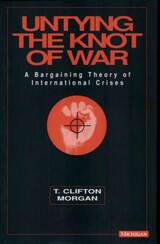
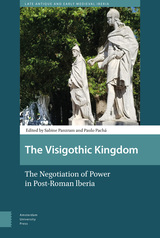
READERS
Browse our collection.
PUBLISHERS
See BiblioVault's publisher services.
STUDENT SERVICES
Files for college accessibility offices.
UChicago Accessibility Resources
home | accessibility | search | about | contact us
BiblioVault ® 2001 - 2024
The University of Chicago Press









